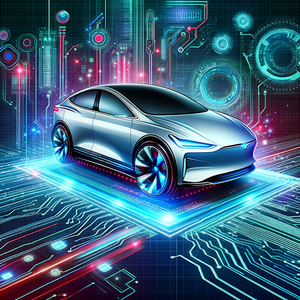Electric Vertical Take-Off and Landing (eVTOL) technology has been a buzzword in the aviation industry for quite some time now. The concept of eVTOL vehicles revolves around electric propulsion systems and VTOL features, offering a zero-emission and low-noise operation. The potential benefits of eVTOL technology are enormous; however, several challenges need to be addressed. In this article, we are going to explore the current state of eVTOL in the US, highlighting the progress, challenges, and prospects of this revolutionary technology.
Progress So Far
The US has been a pioneer in eVTOL technology and is home to several leading eVTOL companies, including Boeing subsidiary Wisk Aero, Beta Technologies, Joby Aviation, Archer Aviation, and many more. Over the past few years, these companies have made significant progress in developing eVTOL prototypes and conducting test flights. For instance, Wisk Aero has completed more than 1600 test flights of its eVTOL prototype over the past decade, and Archer Aviation has received a $1 billion order for eVTOL aircraft from United Airlines. Moreover, the Federal Aviation Administration (FAA) has also been supportive of eVTOL development, issuing guidelines and regulations to ensure the safety and reliability of eVTOL vehicles.
Challenges Faced by eVTOL Development
Despite the progress made, several challenges need to be addressed to make eVTOL a viable and sustainable mode of transportation. One of the primary challenges is the development of reliable and efficient battery systems. Currently, the batteries used in eVTOL vehicles are heavy, expensive, and have limited range, making them impractical for commercial use. Another challenge is the development of efficient air traffic control systems to manage the growing number of eVTOL vehicles in the skies. Additionally, the infrastructure needed to support eVTOL operations, such as charging stations and landing pads, needs to be developed.
Future Prospects of eVTOL Technology
Despite the challenges, the prospects of eVTOL technology are promising. The potential benefits of eVTOL, such as reduced emissions, reduced noise pollution, and enhanced transportation efficiency, make it an attractive option for several industries, including urban air mobility, emergency services, and package delivery. Moreover, the increasing demand for sustainable and efficient transportation solutions is expected to drive the growth of the eVTOL market in the coming years.
Revolutionizing Urban Travel: Meet the Leading eVTOL Players in the US
Archer Aviation
Archer Aviation is a US-based electric aircraft manufacturer focused on the development of eVTOL technology. The company was founded in 2018 and has already raised $1.1 billion in funding. Archer’s aircraft can carry four passengers and fly for up to 60 miles on a single charge. The company is currently working on building its manufacturing facility in Florida and aims to begin commercial operations in 2024.
Beta Technologies
Beta Technologies is a Vermont-based electric aviation company that has been developing vertical takeoff and landing aircraft for cargo and passenger transportation. The company's two aircraft models (ALIA-250 and CX300) are capable of flying up to 170 miles per hour with a range of 250 and 386 miles respectively. Beta Technologies has secured over $368 million to fund its development and manufacturing processes.
Joby Aviation
Joby Aviation is one of the leading companies involved in eVTOL development in the USA. The company was founded in 2009 and has since become one of the biggest names in the industry. Joby’s aircraft is capable of vertical takeoff and landing, a top speed of 200 mph, a range of 150 miles, with a payload of up to 1,000 pounds. The company has raised over $800 million and has partnered with notable industry players such as Toyota and Uber. Joby Aviation aims to launch its commercial air taxi service in the coming years.
Vertical Aerospace
Vertical Aerospace is a UK-based aviation company with operations in the USA that designs and manufactures eVTOL aircraft. The company's aircraft is capable of vertical takeoff and landing, with a range of 100 miles, with a cruising speed of 150 mph. Vertical Aerospace is currently working on the VA-X4 aircraft, which is expected to have a range of over 200 miles. The company has raised over $115 million in funding for its vertical transportation business.
Wisk Aero
Wisk Aero is a joint venture between Boeing and Kitty Hawk, founded in 2019 and based in California. The company has developed and tested an autonomous, electric air taxi capable of flying up to 120 knots with a range of 90 miles. Wisk Aero plans to collaborate with urban air mobility (UAM) partners to offer air taxi services in the various cities where they will operate.
Conclusion
The rise and development of eVTOL technology denote an exciting era in the evolution of transportation. With leading companies in the USA such as Joby Aviation, Archer Aviation, Beta Technologies, Wisk Aero, and Vertical Aerospace driving significant progress, we stand on the brink of a transformation in air travel. These companies are crafting innovative, sustainable, and eco-friendly solutions that promise to revolutionize commuting, making it faster, more efficient, and environmentally friendly. Yet, the path to widespread adoption of eVTOL is laden with challenges including the development of efficient battery systems and air traffic control systems, which must be addressed to realize its full potential.
Read More on this Topic:
- Archer Aviation: https://www.archer.com/
- Beta Technologies: https://www.beta.team/
- Joby Aviation: https://www.jobyaviation.com/
- Vertical Aerospace: https://vertical-aerospace.com/
- Wisk Aero: https://wisk.aero/
- Vertical Magazine: https://www.verticalmag.com/
- Electric VTOL News by the Vertical Flight Society: https://evtol.news/
- TechCrunch - Transportation: https://techcrunch.com/transportation/
Join the conversations that are shaping our future
On our sustainability website, you can connect with like-minded individuals, share your own ideas, and learn from the experiences of others. Participate in our interactive forums, join our dedicated groups, and contribute to our comprehensive directory. Together we can make a difference. Let's collaborate to create a sustainable world.
Join Now and become a part of our thriving community!


